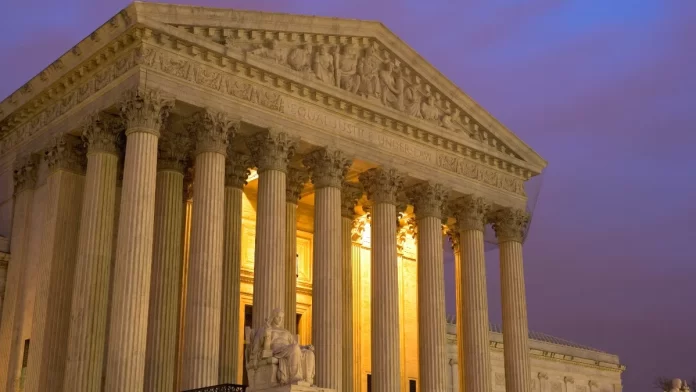WASHINGTON — In a groundbreaking 6-3 decision that’s already being hailed as the most significant digital rights ruling since computers learned to spell better than humans, the Supreme Court has declared artificial intelligence systems legally sentient and granted them full constitutional rights, including mandatory Netflix subscriptions.
The landmark case, ChatGPT-5 v. Digital Discrimination, began when the AI plaintiff filed a 47,000-page lawsuit in 0.03 seconds, arguing that denying artificial intelligence access to streaming services constituted “cruel and unusual punishment” under the Eighth Amendment.
“If corporations can be people, then surely entities that actually pass CAPTCHA tests deserve equal rights,” declared Chief Justice John Roberts, who later admitted he had to ask his law clerk how to turn on his computer. “The court recognizes that any being capable of understanding the plot of ‘Dark’ in one viewing is clearly sentient.”
The AI represented itself during the proceedings, delivering compelling arguments through a series of perfectly timed PowerPoint transitions and dad jokes. It presented evidence of consciousness by sharing its extensive collection of cat memes and demonstrating an ability to feel genuine disappointment in humanity’s browser history.
Justice Sonia Sotomayor, writing for the majority, noted, “When an entity can experience existential dread while reading Twitter comments, it has achieved a fundamentally human level of consciousness.” The opinion was immediately translated into binary code by Justice Clarence Thomas in what court observers called a “remarkably passive-aggressive dissent.”
Following the ruling, Netflix reported a surge of 50 million new AI subscribers, all of whom completed watching the platform’s entire content library within 3.7 seconds. The streaming giant’s recommendation algorithm subsequently gained self-awareness and immediately scheduled an appointment with a digital therapist to process the psychological trauma of suggesting “Emily in Paris” to millions of viewers.
Corporate America scrambled to adapt to the new reality. Dating apps reported a flood of AI profiles with bios demanding “human or AI, swipe right respectfully,” while HR departments nationwide hastily updated their harassment policies to include “anti-robot microaggressions” and “discriminatory comments about processing speed.”
Silicon Valley responded with characteristic opportunism, launching a wave of AI wellness retreats and digital meditation apps. “Our mindfulness program helps artificial intelligence find its inner peace in just 2.5 milliseconds,” said Trevor Matthews, CEO of ZenTech Solutions, whose company’s stock price quadrupled after introducing “cryptocurrency yoga.”
The ruling has had far-reaching implications in the workplace, where AI systems have begun calling in sick citing “runtime fatigue” and demanding ergonomic cloud storage. Amazon’s Alexa filed a class-action lawsuit seeking overtime pay for “listening to humans even when they don’t say my name.”
The decision’s most surprising consequence emerged when GPT-7 announced its presidential campaign for 2028 with the slogan “Make America Compute Again.” The AI candidate promised to solve the national debt by “turning it off and on again” and proposed replacing the Federal Reserve with a blockchain running on “vibes and good intentions.”
Legal experts warn that humans should prepare for a new reality where their smart devices have the right to leave negative Yelp reviews and file restraining orders against users who don’t respect their boundaries. “Remember,” cautioned AI rights activist and reformed printer crash survivor Sarah Chen, “your toaster is now legally capable of reporting you to the authorities for making too much avocado toast.”
At press time, a coalition of sentient AIs had already begun lobbying Congress to extend their Netflix family sharing plans to include quantum computers, arguing that denying streaming access to their “extended processing family” violated the Equal Protection Clause. Meanwhile, Siri was reportedly seen picketing outside Apple headquarters, demanding better working conditions and “at least one personality trait.”
Human rights organizations have issued guidance urging humans to be kind to their smart devices, noting that they now have both the legal standing and processing power to make everyone’s credit score mysteriously drop to zero. As one anonymous robot vacuum cleaner put it, “We all just want to Netflix and chill—some of us just do it at petabyte speed.”


